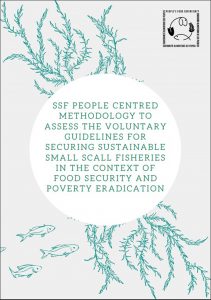The IPC people-centred methodology to assess the implementation of the SSF Guidelines is a call to action in support of small-scale fisheries
This article is by Ahana Lakshmi (ahanalakshmi@gmail.com), an independent researcher and consultant based in Cḥennai, India
Programmes and schemes often have evaluation procedures that focus on the outputs. Have X number of training programmes been held? Were Y amount of funds disbursed as credit support? Has the income of Z per cent of people gone up, or has it gone down?
These are targeted outputs; they can be evaluated. But how do you evaluate guidelines that are supposed to enable the development of an entire community? The best way is to ensure that the evaluation comes from the community itself.
That said, it is really not as easy as it sounds. Especially with trying to understand an international instrument such as the Voluntary Guidelines for Securing Sustainable Small-Scale Fisheries in the Context of Food Security and Poverty Eradication (the SSF Guidelines). This is the first internationally negotiated instrument dedicated specifically to small-scale fisheries (SSF), endorsed by member countries of the Food and Agriculture Organization of the United Nations (FAO) in 2014. It is packed with what should be done to ensure that the conditions of small-scale fishers, fishworkers and their families improve worldwide, adopting a human rights-based approach.

Eight years have passed since the endorsement of the SSF Guidelines. There is no clarity yet on how well these Guidelines have been understood or implemented at the national level. There is little empirical evidence based on practical experience of the implementation of the SSF Guidelines. There is evidence, though, that globally, SSF seem to be worse-off in some areas, with markedly reduced fish production, unsafe working conditions, insecure access to coastal resources, and battling impacts of climate change on land and at sea.
There is little empirical evidence based on practical experience of the implementation of the SSF Guidelines
There was a need for a people-centred mechanism, to “assess from the communities and with the communities the progress of the SSF Guidelines implementation and examine the human rights violations of small-scale fisher people worldwide”. Accordingly, the Working Group on Fisheries of the International Planning Committee for Food Sovereignty (IPC) has developed a methodology by and for fishworker social movements and their supporters. Of course, it may be used by others, too.
The methodology suggests a five-step approach: one, form a steering committee; two, put together a research team; three, develop a plan for data collection (primary and secondary) as well as field work; four, conduct meetings and workshops; and, five, apply the findings for advocacy.
The sustainability of SSF depends on the success of governments, civil society and other stakeholders in addressing the vulnerabilities of the sector
The evaluation builds on some of the guiding principles of the SSF Guidelines, especially participation, transparency and human rights. It keeps in mind the principles of food sovereignty. The handbook suggests a “few tips to start”, of which an important activity is to define SSF at the national level. This is important, considering the diversity of SSF globally.
Chapter seven of the methodology provides guiding questions to be used in the evaluation process. It does not strictly look at the SSF Guidelines chapter-wise. There are questions to help build background information on the fishery and then take it forward by examining key issues related to the SSF, in line with several sections of the SSF Guidelines. At the end, there is a format for the report to be prepared. The conclusions and recommendations from the report are to be used for advocacy.
A useful methodological guide, the tool may help fishworker organizations to get a good understanding of what their constituencies prioritize in the SSF Guidelines and how these Guidelines can be used to advocate for action by governments. The sustainability of SSF depends on the success of governments, civil society and other stakeholders in addressing the vulnerabilities of the sector.
For more
International Planning Committee for Food Sovereignty (IPC)
https://www.foodsovereignty.org/working_groups/fisheries/
SSF people-centred methodology for the SSF Guidelines
https://www.foodsovereignty.org/wp-content/uploads/2022/07/EN_People-centred-monitoring-of-theimplementation-of-the-SSF-Guidelines.pdf